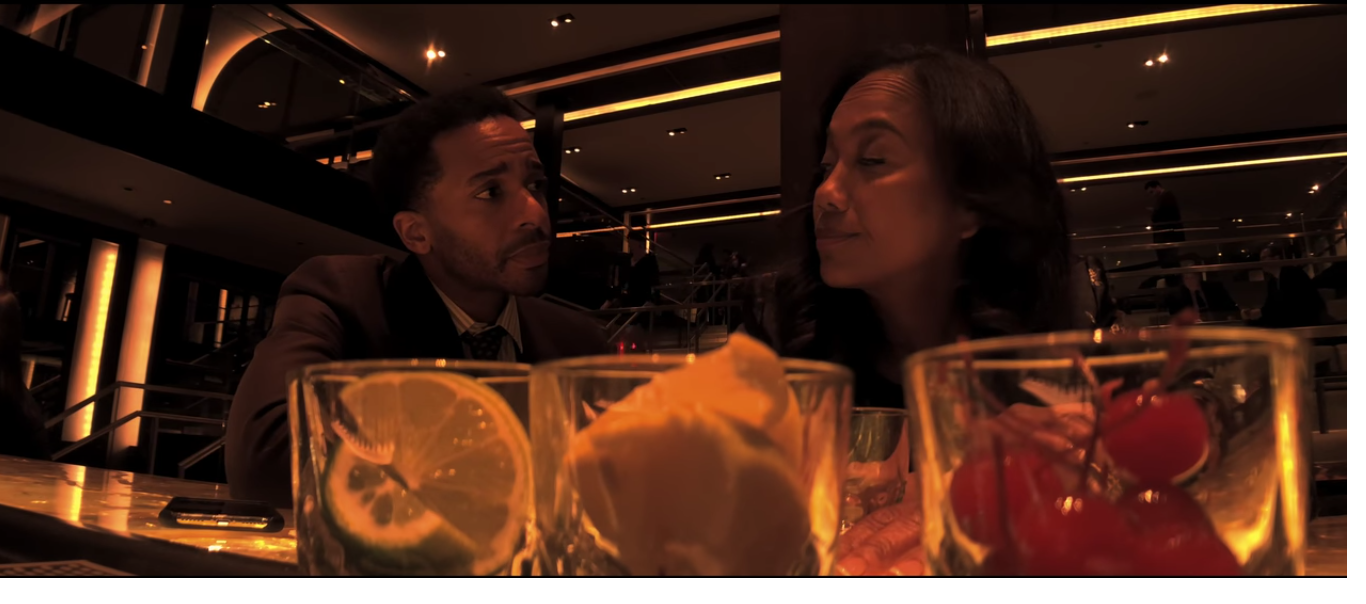
“How do you show a man’s humanity?”
“Remind him of his mortality.”
High Flying Bird is the first project from screenwriter Tarell Alvin McCraney following his last monumental story, the Oscar winning film Moonlight. McCraney’s dialogue here is very snappy, detailed, and intricate, giving off an almost Aaron Sorkin-like feel. Another element of High Flying Bird’s production that made the film’s release notable was director Steven Soderbergh’s choice to shoot the film using only an iPhone. In the film, Soderbergh utilizes a lot of tracking shots and also takes advantage of some of the unique abilities of his chosen camera. The size of the iPhone allows him to achieve shots and angles that may be a little more difficult, or even impossible, with standard cameras. One such shot that I immediately noticed is this review’s featured image from the film located above, a meeting at the bar between Burke and the Pro Players’ Association President Myra (Sonja Sohn) where Burke attempts to gather intel on the lockout. The iPhone was placed on the bar, pointing at a tilted upward angle at the two characters. It imparted the feel of being privy to an off the record, insiders’ convo, a pretty neat effect. Following in the footsteps of such films like Sean Baker’s Tangerine or Zack Snyder’s short film Snow Steam Iron, High Flying Bird displays the capacity of using technology like cell phones to produce films, in effect democratizing film-making and expanding the field of potential filmmakers.
Thematically, High Flying Bird attempts to provide commentary on the unbalanced power dynamic between billionaire owners and the millionaire players they employ where the owners can claim ownership over their labor, image potential, and turn off the faucet on said millions in order to squeeze more dollars out of their employment agreement. Burke’s conflict over his part in this delicate dance becomes the central conflict of the film as he tries to help his client deal with the work stoppage. As a black agent guiding black clients, Burke starts to consider the lack of independence, control, and ownership his clients have under a system that operates largely on their work product. He eventually makes it a point to try to leverage this power into an avenue that results in not only money for he and his client, but a greater say in the overall product. Interspersed within the film are interludes from real life NBA players explaining basketball culture and their backgrounds, providing real-life perspective on the film’s plot points. In addition to critiquing the labor structure of professional sports for black athletes, High Flying Bird also touches on guilt and grief as part of what fuels Burke’s pursuit of a new paradigm is his unaddressed grief regarding his cousin, a former player and client who died following his playing career after struggling to adapt to a life without basketball. Burke feels partly responsible for not preparing him for said life and in working to achieve a bigger seat at the table for players, subconsciously at the very least, he feels it will help to atone for his inability to save his cousin.
High Flying Bird moves extremely slowly and fails to present any interesting story thread, theme, or point it wants to make until the last half hour of the film. It’s eventual plot thread of a disruptor seeking to challenge the manufactured status quo that stifles workers who are the lifeblood of an industry in favor of disproportionately rewarding owners and management who contribute little by comparison, as a way of coming to terms with his own guilt over not preventing this inequity from claiming the life of a beloved family member would have been interesting to explore over the full course of the film rather than the end. The interludes from real life NBA players explaining basketball culture and their backgrounds in advance of plot points within the actual film feels unnecessary and didn’t add anything of value. The story itself could have told us these things, their commentary didn’t, and shouldn’t, have to. Despite the powerhouse names in front of and behind the camera, High Flying Bird fails to offer a worthwhile viewing experience.
Image: Netflix

